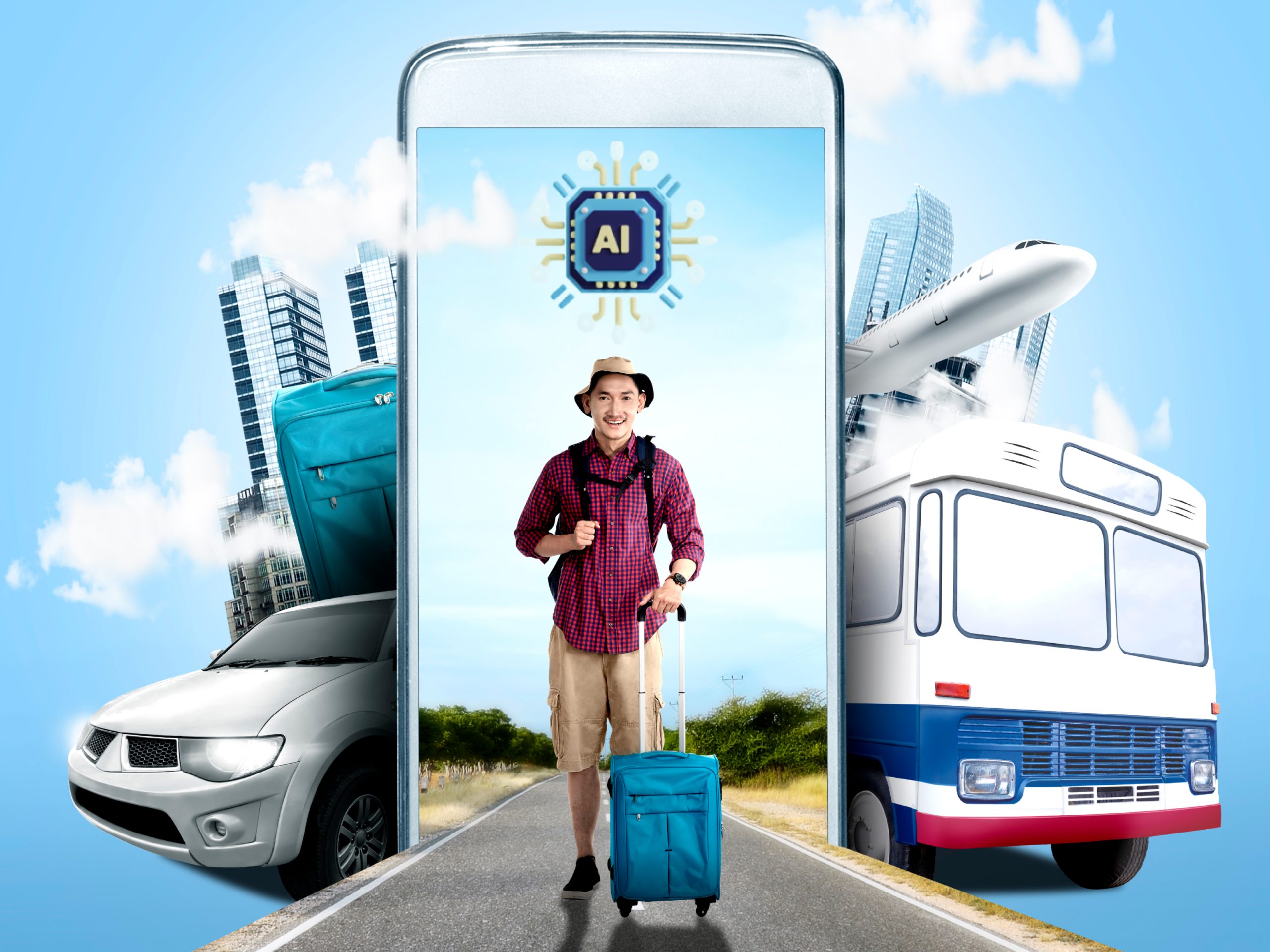The quality of travel is further enhanced by other breakthroughs such as deep learning, big data, and natural language processing (NLP).
Join us as we dive into the incredible ways that AI, deep learning, big data, and natural language processing are transforming travel and hospitality.
Table of Contents
How is AI Changing the Tourism Industry?
Artificial intelligence (AI) is changing tourism fundamentally and not simply revolutionizing sectors. Let’s examine how artificial intelligence propels the tourist sector.
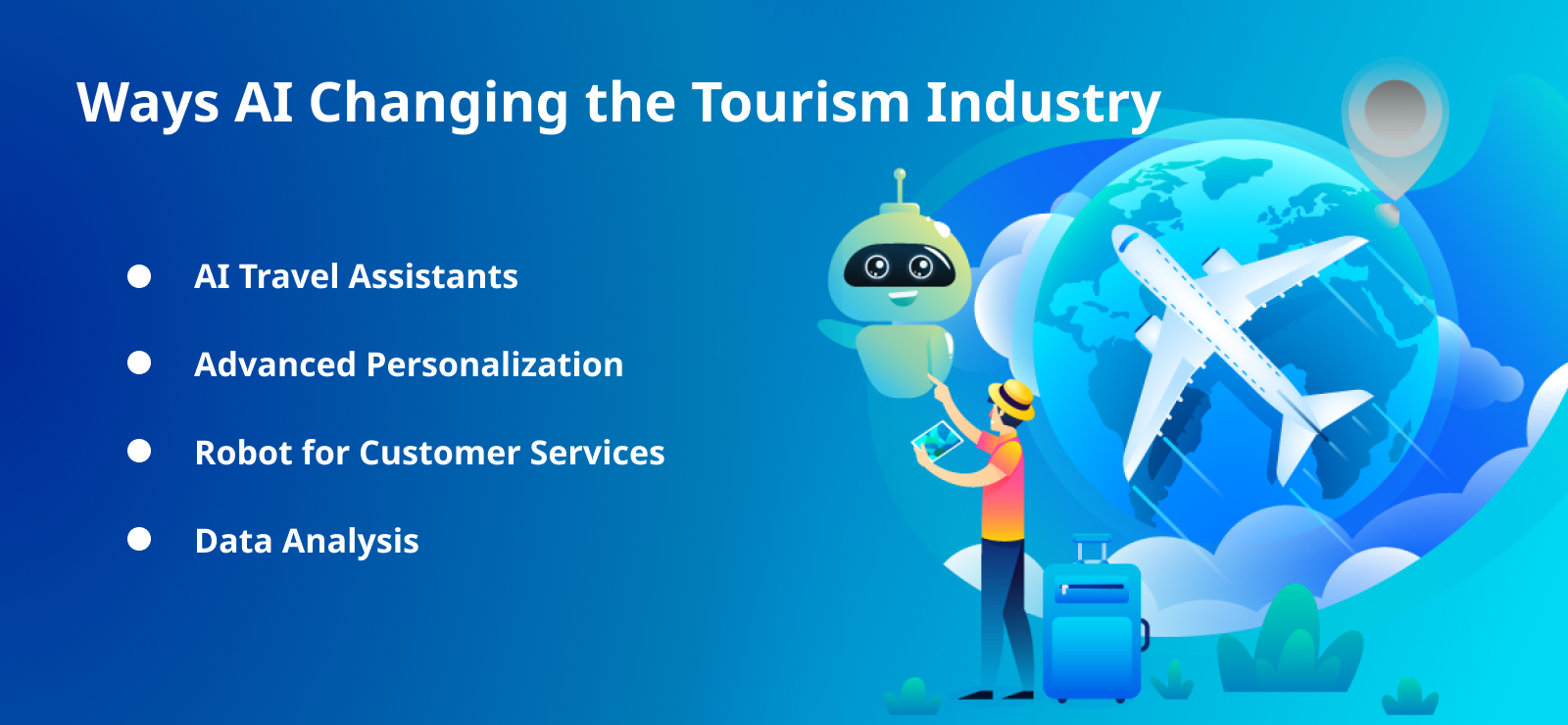
AI-driven travel assistants are digital friends who aid tourists on their travels. These helpers can offer up-to-date details on travel, lodging, and nearby attractions and even make customized itinerary recommendations.
For instance, chatbots integrated with travel apps can act as a virtual concierge by instantly answering questions, making travel recommendations, and helping with reservations.
Advanced Personalization
Artificial intelligence (AI) uses massive data analysis to comprehend personal preferences and actions. This makes it possible for travel agencies to provide customized experiences, including recommendations for activities, lodging, and destinations.
For example, customized travel plans that consider travelers’ location, historical travel preferences, and internet activity guarantee that each trip is tailored to them.
Robot for Customer Services
AI solutions for the travel industry, like robots, are used in various travel-related settings, including hotels, airports, and tourist destinations, to help clients. Not only can these robots check people in, but they can also carry luggage.
For example, to improve the travel experience, airports’ robots can assist with language translations, answer inquiries, and direct travelers to their gates.
Data Analysis
Artificial intelligence in tourism is superior at analyzing large amounts of data to produce insightful findings. Making educated business decisions in the tourism sector requires an awareness of consumer behavior, tastes, and trends.
For example, AI can determine which attractions are popular, point out areas that need work, and offer insightful feedback for marketing campaigns by examining consumer evaluations and feedback.
Navigate the future of travel with our AI-driven predictions and optimize your business strategies.
Benefits of Artificial Intelligence in Tourism
Artificial intelligence (AI) in travel and hospitality is undergoing a change that provides several advantages that improve the whole travel experience. Here are a few main benefits of AI in tourism:
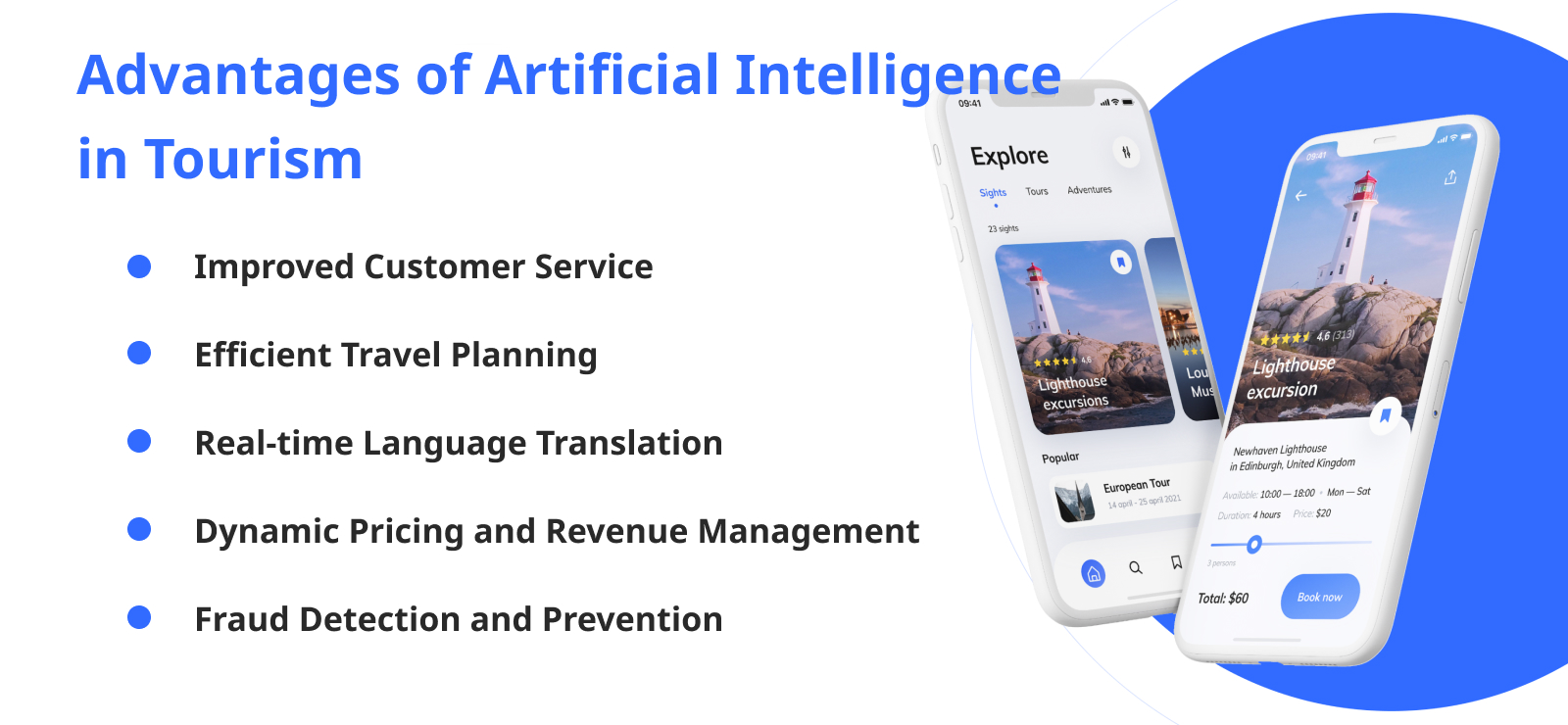
Faster and easier information and help access for travelers leads to increased customer satisfaction. AI-powered customer care guarantees consistent and dependable assistance while reducing response times.
Efficient Travel Planning: AI’s ability to streamline travel planning is that it gathers and analyzes enormous volumes of information about locations, lodgings, and modes of transportation. It can identify the greatest deals, recommend experiences off the usual path, and generate optimum itineraries.
Travelers can save time and effort by getting detailed travel itineraries customized to their tastes. AI solutions for the travel industry also assist tourists in making economic decisions, resulting in a more affordable journey.
Real-time Language Translation: AI-powered language translation systems make real-time contact between visitors and residents possible, eliminating language barriers.
Making it easier for visitors to engage with, explore, and comprehend local cultures and practices improves the travel experience.
For instance, smartphone apps such as Google Translate facilitate traveler communication and exploration, which employ AI algorithms to deliver instant translations for text, speech, and even signage.
Dynamic Pricing and Revenue Management: To determine the best costs for travel, lodging, and services, artificial intelligence (AI)-driven pricing systems examine demand, seasonal patterns, and other variables in real-time. This increases profits for the travel industry while giving clients a choice of affordable costs.
To guarantee that customers receive the greatest deals while airlines optimize revenues, airlines employ AI algorithms to modify ticket prices based on variables like seat availability, booking time, and demand.
Fraud Detection and Prevention: Artificial intelligence (AI) detects and stops fraudulent actions like credit card fraud, identity theft, and booking scams. This helps safeguard the tourism sector. It protects travelers and businesses from hazards related to money and security.
For instance, AI systems can examine payment transactions for odd trends and identify possible fraud, assisting travel agencies in preventing losses and guaranteeing a safe and secure passenger experience.
Top Trends of Artificial Intelligence in Tourism
AI in travel and hospitality still spurs innovation in the industry. These are the most popular AI trends in tourism to look forward to:
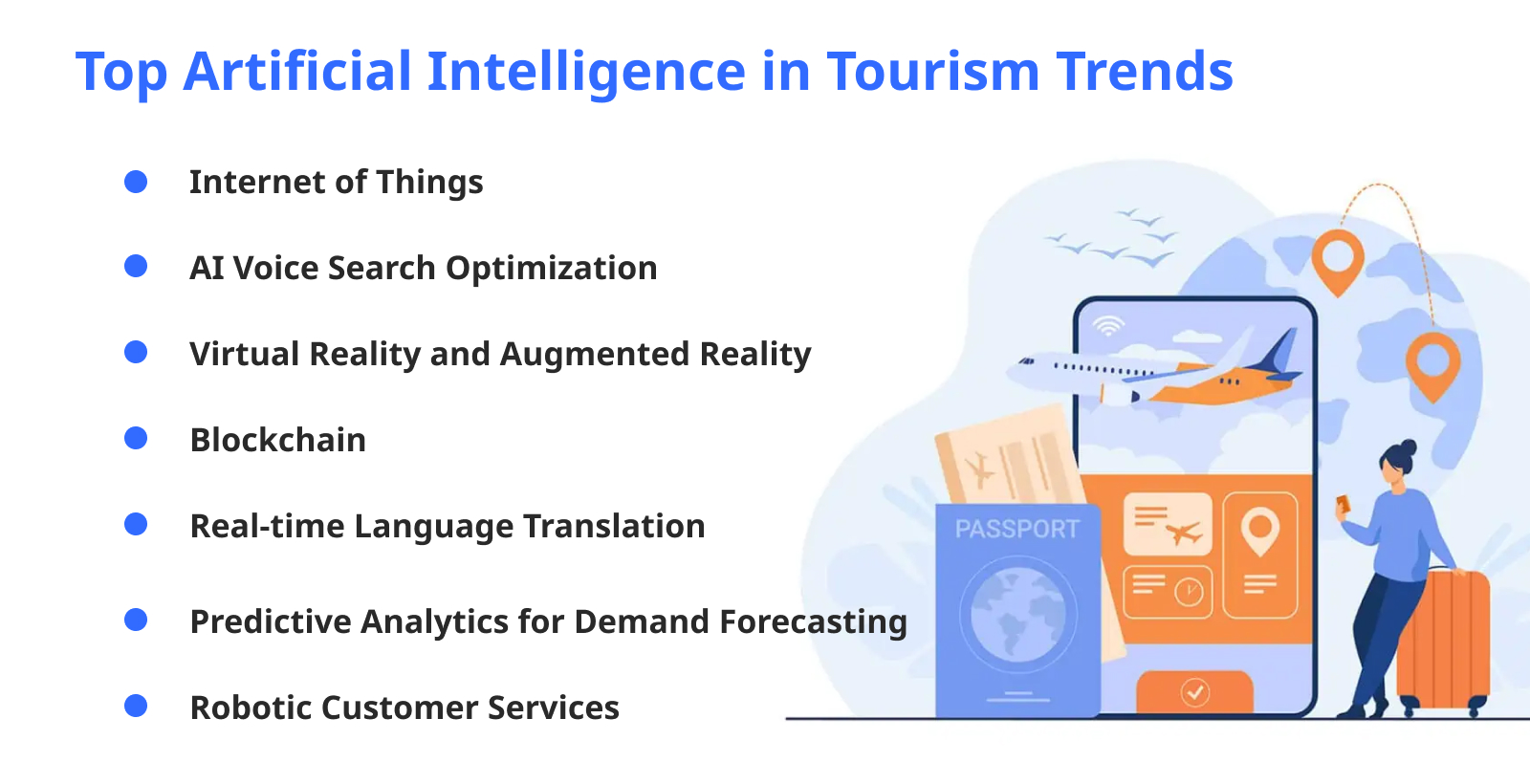
The widespread use of IoT devices has also created a pathway to fuse AI and travel successfully. Thanks to artificial intelligence and machine learning, travelers may utilize their devices for voice searches, reservations, and trip planning.
For example, FlightBeat is an AI-powered sensor technology that AirFrance KLM employs to track customers’ heart rates while in flight. British Airways uses similar technology to track passengers’ emotions through the Happiness Blanket.
AI Voice Search Optimization
AI-driven voice search optimization uses speech recognition and natural language processing (NLP) technologies to improve how travelers connect with travel agencies and search for information.\
This development recognizes the increasing inclination towards voice-activated search queries, which enables travel agencies to offer more individualized and accessible services.
For example, travel agencies are integrating voice assistants with AI into their websites and mobile applications. With genuine communication, these assistants can book flights, hotels, and other travel-related services and provide individualized recommendations. They can also comprehend and react to voice commands.
Virtual Reality and Augmented Reality
Immersion technologies like Augmented Reality (AR) and Virtual Reality (VR) improve the trip experience. VR creates fully virtualized settings, whereas AR superimposes digital data on the actual world.
AI in tourism improves these experiences by offering recommendations, interactive elements, and context-aware information.
For instance, virtual reality (VR) in tourism can provide virtual tours of locations, enabling visitors to experience areas before visiting. Contrarily, augmented reality (AR) may translate signage, give passengers real-time information about landmarks, and even provide historical context as they navigate a city.
By comprehending user preferences and making tailored recommendations based on their interests, AI systems improve these experiences.
Blockchain
The tourism sector is seeing a growing reliance on blockchain technology. It is a secure, decentralized ledger system that keeps track of transactions on several computers.
It serves several functions in the tourism industry, including guaranteeing safe and transparent transactions, building confidence, and offering an impenetrable record of operations.
For example, smart contracts, or self-executing contracts with conditions explicitly encoded into code, are created using blockchain technology in the travel business. These agreements protect and automate bookings for things like travel or lodging.
Furthermore, by guaranteeing that every party to a transaction has access to the same data, blockchain’s distributed ledger lowers the possibility of disagreements or fraud.
Real-time Language Translation
Real-time language translation allows spoken or written text to be translated instantly. In the tourism sector, this technology makes it easier for visitors and locals—who may speak different languages—to communicate smoothly.
By removing language barriers, this trend improves the visitor experience by enabling people to communicate with locals, read signs, and find their way around foreign locations more skillfully.
It encourages closer linkages between visitors and the communities they are visiting and cultural interchange.
Predictive Analytics for Demand Forecasting
AI-powered predictive analytics combines a variety of criteria, current trends, and historical data to estimate future demand for travel services. This makes it possible for companies to efficiently organize their inventory, marketing campaigns, and resource allocation.
For instance, a travel firm may employ AI algorithms to forecast future demand for particular vacation destinations or packages by examining historical booking trends, seasonal fluctuations, and outside variables (such as holidays or events).
Robotic Customer Services
The tourism sector uses AI-driven chatbots and robots to provide recommendations, respond to inquiries, and offer immediate customer service. These automated services improve client experiences by responding promptly and precisely.
For instance, chatbots are being used by hotels and airlines on their websites and mobile apps to help with booking queries, room availability, and flight details and even to offer recommendations for nearby places to visit.
Explore the benefits of our AI-powered services to enhance your tourist offerings and maximize revenue.
The Future of Artificial Intelligence in Tourism
Artificial intelligence (AI) in tourism has the potential to completely change how travelers book, organize, and enjoy their travels. Here are some significant patterns and prospective advancements in this field:
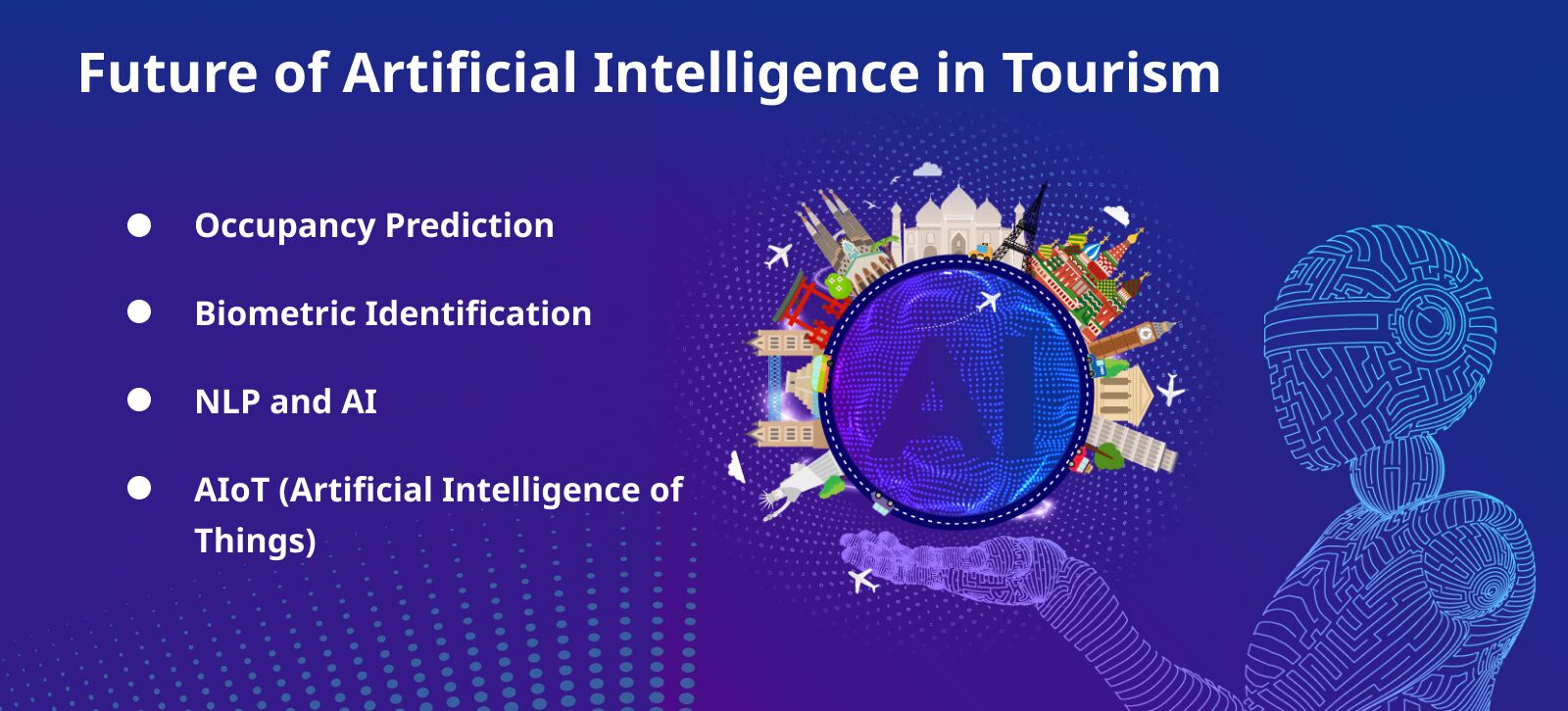
Hotels and airlines will invest in data science and deep learning algorithms to improve occupancy forecasts. They will be able to allocate their resources better to cut costs and increase revenues with the aid of this predictive superpower.
Additionally, this technology can be used by any travel management company to plan travel packages.
Biometric Identification
The New York Times reports that airports are searching for ways to employ facial recognition and other biometric verification techniques.
Facial recognition technology is also 99.5% accurate to the National Institute of Standards and Technology. Airlines will soon require travelers to undergo biometric verification before boarding.
NLP and AI
NLP and AI Tech businesses will use these technologies to create neural networks and algorithms replicating and analyzing human emotions. Through language model technologies such as GPT-4, travel agencies can enhance their platform localization and translation services.
AIoT (Artificial Intelligence of Things)
Numerous AI-optimized devices will result from the Internet of Things and artificial intelligence working together. Autonomous vehicles are the most well-known application of AIoT. Travelers will soon be able to reach their destinations via self-driving ride-hailing services.
Final Thoughts
The future of travel forecasting lies in the power of artificial intelligence. With the help of advanced technologies and predictive algorithms, AI can accurately forecast tourist hotspots and provide valuable insights into the trends and patterns of travel.
As the world continues to change and evolve, AI in tourism plays a crucial role in helping the travel industry adapt to travelers’ changing needs and preferences.
Whether it’s predicting the next must-visit destination or analyzing consumer behavior, AI is transforming how we think about travel forecasting and opening up new possibilities for the future of tourism with its AI services for the travel industry. In case you still need clarification, hire AI developers for professional guidance.
Let's discuss how we can create a roadmap to success for your travel business with our tailored AI solutions.

